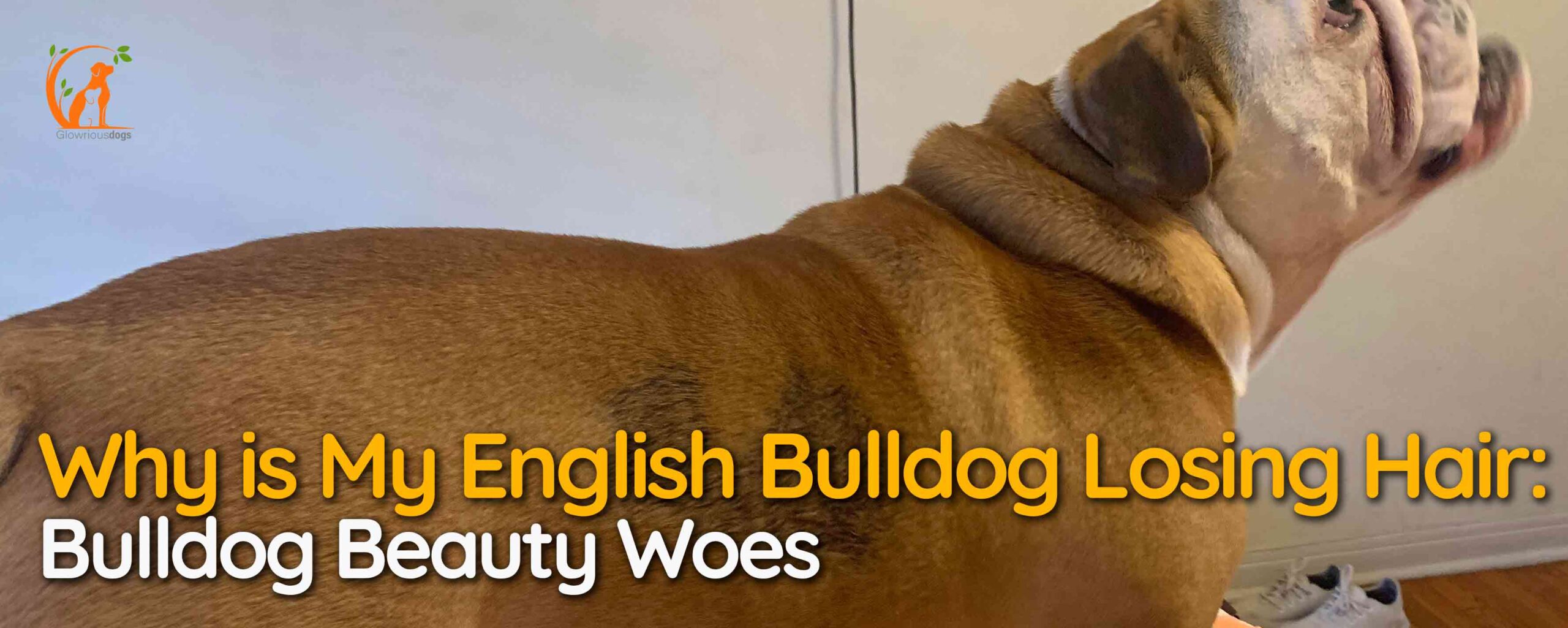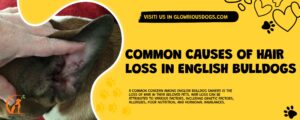Your English Bulldog may be losing hair due to various reasons such as allergies, hormonal imbalances, parasites, or underlying health issues. It is important to consult a veterinarian to identify the exact cause and provide appropriate treatment for your dog’s hair loss.
In the meantime, ensure your Bulldog has a healthy diet, proper grooming, and a clean living environment to support their overall well-being.
Common Causes Of Hair Loss In English Bulldogs
A common concern among English Bulldog owners is the loss of hair in their beloved pets. Hair loss can be attributed to various factors, including genetic factors, allergies, poor nutrition, and hormonal imbalances.
Genetic factors play a significant role in hair loss among English Bulldogs. Some Bulldogs may inherit genes that make them more susceptible to hair loss, leading to bald patches or thinning hair.
Allergies can also contribute to hair loss in English Bulldogs. Allergic reactions to certain foods, environmental factors, or parasites like fleas can cause itching and hair loss.
Poor nutrition is another common cause of hair loss. Bulldogs may lose hair if they are not receiving an adequate diet that supports healthy hair growth. Diets lacking essential nutrients, such as protein, vitamins, and minerals, can lead to hair loss.
Hormonal imbalances can disrupt the normal hair growth cycle and lead to hair loss. Issues with thyroid hormones, adrenal glands, or the reproductive system can result in hair loss in English Bulldogs.
Genetic Factors And Hair Loss
Hair loss in English Bulldogs can be attributed to genetic factors. Family history plays a significant role in determining the likelihood of hair loss in these dogs. It is essential to understand the common genetic disorders that Bulldogs are prone to, as they can lead to hair thinning or shedding.
| Common Genetic Disorders in Bulldogs | Description |
| Color Dilution Alopecia (CDA) | This disorder affects dogs with diluted coat colors, leading to hair loss and skin problems. |
| Canine Follicular Dysplasia | A condition where hair development is abnormal, resulting in hair loss and skin abnormalities. |
| Hypothyroidism | An underactive thyroid gland that can cause hair loss, among other symptoms. |
| Demodectic Mange | A parasitic skin disease that can cause hair loss, itchiness, and inflammation. |
To address hair loss in English Bulldogs, it is essential to consult a veterinarian with experience in dermatology. They can perform necessary tests and provide appropriate treatments to manage the genetic factors contributing to hair loss. Additionally, maintaining a healthy diet, regular grooming, and proper parasite control can help support healthy skin and minimize hair loss in Bulldogs.
Allergies And Hair Loss
Environmental allergens, food allergies, and skin irritants can all contribute to hair loss in English Bulldogs. These factors can trigger itching, inflammation, and ultimately hair loss in affected dogs.
Environmental allergens such as pollen, dust mites, and mold spores can cause allergic reactions in Bulldogs. When exposed to these allergens, your Bulldog may develop itchy skin, which can lead to excessive scratching and hair loss.
Food allergies can also lead to hair loss in English Bulldogs. Certain ingredients in your Bulldog’s diet, such as grains, beef, chicken, or dairy products, can trigger an allergic reaction. This can result in skin inflammation and subsequent hair loss.
Additionally, skin irritants like harsh chemicals in grooming products or environmental factors like extreme temperatures can contribute to hair loss in Bulldogs. These irritants can damage the skin, causing hair loss in the affected areas.
Poor Nutrition And Hair Loss
One possible reason for an English Bulldog losing hair is poor nutrition. Deficiencies in essential nutrients can contribute to hair loss. Dogs that are not getting the right balance of vitamins, minerals, and other essential nutrients may experience hair loss as a result. Another factor to consider is the quality of the dog food they are consuming. Low-quality dog food may lack the necessary nutrients needed for a healthy coat and may contribute to hair loss. Additionally, an imbalanced diet can also lead to hair loss in English Bulldogs. It is important to provide a well-balanced diet that includes all the essential nutrients to support a healthy coat and overall well-being.
Hormonal Imbalance And Hair Loss
A common reason for an English Bulldog losing hair is hormonal imbalance. Hormones play a crucial role in regulating hair growth and loss. Hormone-related disorders such as thyroid dysfunction and Cushing’s disease can contribute to hair loss in Bulldogs.
Thyroid dysfunction occurs when the thyroid gland does not produce enough hormones, leading to hair loss, dry skin, and weight gain. Cushing’s disease, on the other hand, occurs when the adrenal glands produce excessive amounts of cortisol. This hormonal imbalance can lead to hair thinning and patchy hair loss.
If you notice your Bulldog experiencing hair loss, it is important to consult with a veterinarian. They can assess your Bulldog’s hormone levels through blood tests and recommend appropriate treatment options, such as hormone replacement therapy or medication to manage the underlying hormonal imbalance.
Identifying Hair Loss In Your English Bulldog
If you’ve noticed that your English Bulldog is losing hair, it’s important to identify the cause in order to provide appropriate care. One common cause of hair loss is patchy hair loss. This can be a symptom of an underlying skin condition, such as allergies or infections. Another potential cause is excessive shedding, which may be due to seasonal changes, hormonal imbalances, or inadequate nutrition. Additionally, a thinning coat can be a result of aging or certain medical conditions.
When dealing with hair loss in your English Bulldog, it is essential to consult with a veterinarian to diagnose and treat the underlying cause. It’s important to note any other accompanying symptoms such as itching, redness, or dry skin, as this can aid in the diagnosis. By addressing the root cause, you can help your beloved pet regain a healthy and lustrous coat.
Patchy Hair Loss
Patchy Hair Loss:
English Bulldogs, like any other breed, may experience hair loss for various reasons. One common cause of patchy hair loss is a Ringworm Infection. This fungal infection can affect the skin, causing round, scaly patches which can be itchy or inflamed.
Folliculitis is another condition that can lead to hair loss. It occurs when hair follicles become infected or inflamed, often due to bacteria. Bulldogs with folliculitis may have red, pustules or sores on their skin, and hair loss can occur in these affected areas.
Demodectic Mange, caused by mites, is yet another possible cause of hair loss. It typically appears as hairless patches that are red, scaly, or inflamed. Bulldogs may also experience itching or discomfort as a result of this condition.
If you notice your English Bulldog experiencing patchy hair loss, it is crucial to seek veterinary attention. Proper diagnosis and treatment can help address the underlying cause and promote healthy hair regrowth.
Excessive Shedding
Excessive shedding is a common concern among English Bulldog owners. One of the reasons for this is seasonal shedding, which typically occurs during the spring and fall months. During these times, Bulldogs tend to shed their winter or summer coat to make way for a new one. It is important to note that this shedding is considered normal and should not be a cause for alarm.
However, if your English Bulldog is experiencing excessive hair loss beyond the usual seasonal shedding, it could be a sign of underlying health issues. Stress and anxiety can also contribute to increased shedding in Bulldogs. If your dog is experiencing excessive shedding accompanied by other symptoms such as itching, redness, or irritation, it is advisable to consult a veterinarian to rule out any medical conditions.
Maintaining a regular grooming routine, including brushing your Bulldog’s coat regularly and providing a healthy diet, can help minimize excessive shedding and promote a healthy coat.
Thinning Coat
English Bulldogs are adorable pets, but it can be concerning when their once-thick coats start to thin out. Hair loss in English Bulldogs can be attributed to a few different factors.
Thinning Coat: As Bulldogs age, it is common for their coat to become thinner. This is a natural part of the aging process, and while it may not be ideal, it is usually nothing to worry about.
Alopecia Areata: Another possible cause of hair loss in Bulldogs is a condition known as alopecia areata. This is an autoimmune disorder where the dog’s immune system mistakenly attacks its own hair follicles, resulting in hair loss. A veterinarian can diagnose this condition through a physical examination and additional tests.
Hypothyroidism: Hypothyroidism, a thyroid disorder, can also lead to hair loss in Bulldogs. When the thyroid gland does not produce enough hormones, it can cause a range of symptoms, including hair loss. Blood tests can help determine if hypothyroidism is the culprit behind hair loss.
If you notice your English Bulldog losing hair, it is important to consult with a veterinarian to determine the underlying cause. They can provide guidance on the best course of action to address the specific issue and help your furry friend regain their luscious coat.
Treatment And Prevention Of Hair Loss In English Bulldogs
When caring for an English Bulldog, it can be concerning to notice hair loss. Consulting with a veterinarian is crucial to determine the cause of the hair loss. Dietary changes may be recommended by the veterinarian to ensure the bulldog is receiving proper nutrition, which can support healthy hair growth. Additionally, implementing proper grooming practices is vital. Regular brushing helps to remove loose hair and debris, promoting a healthy coat. This should be done carefully as Bulldogs have sensitive skin. It is important to use gentle products when bathing the bulldog to avoid irritation. A veterinarian can provide guidance on the appropriate products to use. By following these recommendations, hair loss in English Bulldogs can be treated and prevented, allowing them to have a healthy and beautiful coat.
Consultation With A Veterinarian
Losing hair can be a concerning issue for English Bulldog owners, and seeking professional advice is crucial. Scheduling a consultation with a veterinarian is the first step towards determining the underlying cause of hair loss. Vets will conduct a thorough examination of your Bulldog’s skin and coat, looking for signs of irritation, infections, or other potential issues.
During the consultation, the vet may recommend several diagnostic tests to further investigate the reason behind the hair loss. These tests can include blood work, skin scrapings, or biopsies, aiming to identify any underlying medical conditions such as allergies, hormonal imbalances, or skin infections. The results of these tests will help in developing an effective treatment plan.
In some cases, prescription medications may be necessary to treat the underlying cause of hair loss. Medications such as antibiotics, antifungals, or corticosteroids can be prescribed based on the specific diagnosis. It’s essential to follow the veterinarian’s instructions carefully, including the recommended dosage and duration of treatment to ensure the best outcome.
Topical treatments can also aid in managing hair loss and promoting regrowth. Veterinarians may recommend medicated shampoos, conditioners, or sprays that can help soothe the skin, reduce inflammation, and provide relief from any itchiness or discomfort. Regular use of these topical treatments, along with proper grooming, can improve the overall condition of your English Bulldog’s coat and reduce hair loss.
Dietary Changes
One of the possible reasons why your English Bulldog is losing hair could be due to dietary changes. It is important to ensure that you are feeding your dog a high-quality dog food. Look for dog food that contains essential nutrients such as protein, vitamins, and minerals. These nutrients are crucial for maintaining healthy skin and coat.
In addition to a balanced diet, you may also consider adding nutritional supplements to your dog’s diet. Omega-3 fatty acids, for example, can help improve the overall health of your dog’s skin and coat. Consult with your veterinarian to determine which supplements are suitable for your English Bulldog.
Furthermore, it is important to avoid allergenic ingredients in your dog’s food. Some common allergens for dogs include wheat, soy, and corn. If your English Bulldog has food allergies, it can manifest as hair loss. Consider switching to a hypoallergenic dog food or eliminating potential allergens from their diet.
Grooming Practices
Regular Brushing: One of the most important grooming practices for an English Bulldog is regular brushing. This helps to remove loose hair and prevent matting, which can lead to hair loss. Use a soft-bristled brush or a rubber grooming mitt to gently brush your bulldog’s coat, paying attention to areas where hair loss is occurring.
Bathing Routine: A proper bathing routine is essential for maintaining your bulldog’s coat health. Use a mild, hypoallergenic shampoo specifically formulated for dogs. Avoid using harsh chemicals or irritants that can further irritate your bulldog’s skin and contribute to hair loss. Be sure to thoroughly rinse your bulldog’s coat to remove all shampoo residue.
Avoiding Irritants and Harsh Chemicals: It’s important to avoid exposing your English Bulldog to irritants and harsh chemicals that can cause skin allergies and hair loss. Be cautious when using cleaning products, pesticides, and other chemicals around your bulldog. Keep your bulldog’s environment clean and free from potential irritants.
Conclusion
To sum up, addressing the issue of why your English Bulldog is losing hair is crucial for their overall well-being. By understanding the potential factors such as underlying health conditions, allergies, nutrition, or environmental factors, you can take appropriate measures to alleviate the problem.
Regular vet check-ups, a balanced diet, regular grooming, and a clean living environment are essential for maintaining your English Bulldog’s healthy coat. Remember, addressing hair loss promptly will contribute to your furry friend’s happiness and overall quality of life.
Frequently Asked Questions For Why Is My English Bulldog Losing Hair
How Do You Treat An English Bulldog With Hair Loss?
To treat hair loss in an English bulldog, consult a veterinarian for a thorough examination. They may recommend dietary changes, special shampoos, or supplements to improve their coat health. It’s important to identify and address any underlying health issues that could be causing the hair loss.
Why Is My English Bulldog Losing His Fur?
English bulldogs can lose fur due to various reasons such as allergies, hormonal imbalances, parasites, or skin infections. Regular grooming, a balanced diet, and veterinary care can help address these issues and promote healthy fur growth.
Should I Be Concerned About My Dog Losing Hair?
If your dog is losing hair, it could be a cause for concern. Hair loss may indicate underlying health issues or allergies. It is best to consult a veterinarian to determine the cause and appropriate treatment for your dog.
How Do You Treat Alopecia In Bulldogs?
Alopecia in bulldogs can be treated with topical creams or ointments, oral medication, and dietary changes. You should consult a veterinarian to determine the best treatment plan for your bulldog’s specific condition.












